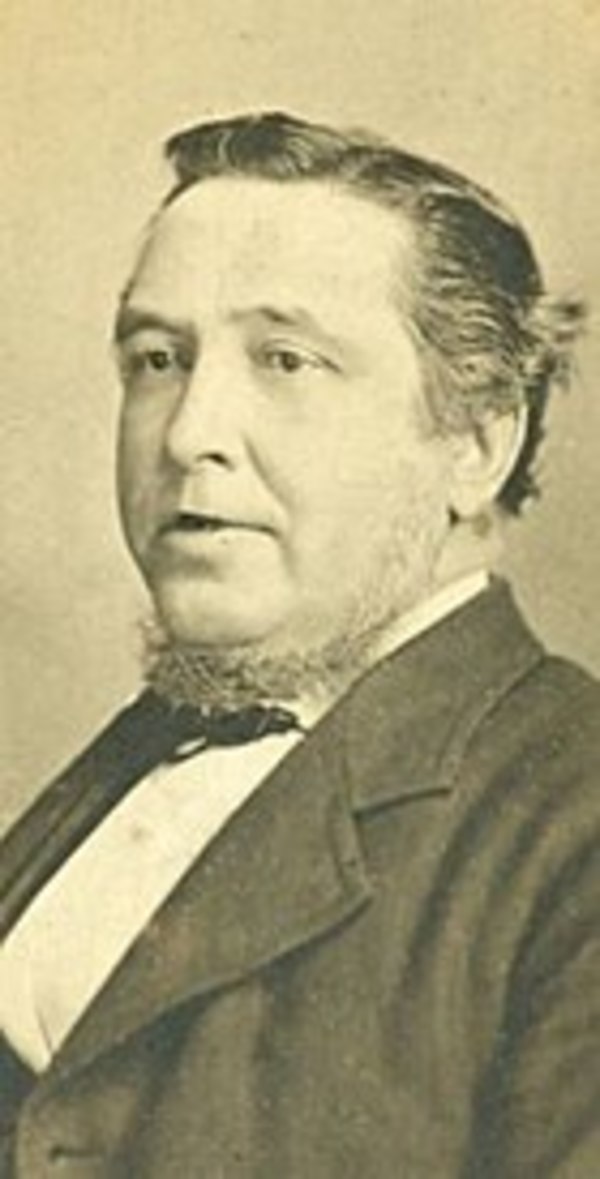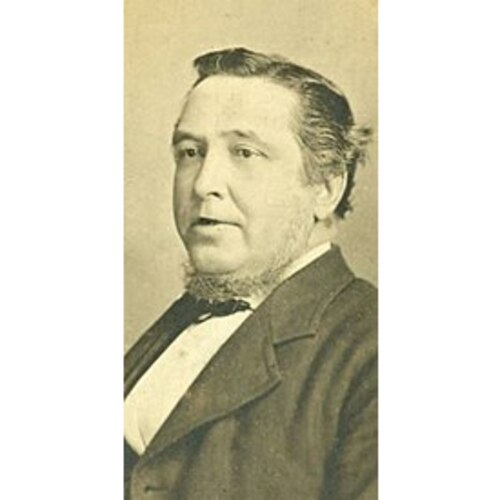
Source: Courtesy of Wikimedia Commons
MACDONALD, CHARLES, professor of mathematics; b. 19 July 1828 in Aberdeen, Scotland, son of John Macdonald, a builder, and Elizabeth —; m. 18 May 1882 Maryanne Stairs in Halifax, and they had one son; d. there 11 March 1901.
Young Charles Macdonald studied arts and divinity at King’s College, Aberdeen. In 1850, aged 22, he took the Hutton Prize, given to the most distinguished scholar at the end of the arts curriculum. Tradition is that he competed for medals in both mathematics and classics, the awards usually going to men who had concentrated on only one; that the mathematics medal he was actually cheated out of. After an ma he studied divinity and became a licentiate in the Church of Scotland. He turned to teaching, however, and he was at Aberdeen Grammar School in 1863 when the Church of Scotland in Nova Scotia selected him as its nominee for the chair of mathematics at Dalhousie College in Halifax.
Macdonald was a gifted teacher, with a wide knowledge of mathematics and a knack for imparting it in concise, luminous form. Precision was what he aimed at, but he was not a pedant; on the contrary, he seemed to delight in terse, elegant exposition. James Gordon MacGregor*, a student of his, who later became a professor at Dalhousie and then at the University of Edinburgh, recalled Macdonald at the blackboard, “his coat covered with chalk-dust, . . . his massive head thrown slightly back, and his face radiant with the consciousness of success in opening up to his class a new field of knowledge and giving them a living interest in it.” “Gentlemen,” he would say in his broad Scots accent, “I am ravished with the thought of introducing you into the delightful mysteries of mathematics in which recreation I am confident we shall both enjoy ourselves.” The students’ reaction was characteristic: “Lead on,” they would respond in effect, “we’re delighted to follow such a leader.” At one point in the late 1860s and early 1870s Macdonald also taught natural philosophy; with mathematics, this put him in front of the blackboard for four hours a day.
Easily the most popular professor on the faculty, he probably said more harsh things to his students than did his colleagues, but they were said with such raciness of expression that the cutting remark was deprived of most of its edge. A few coughs preceded such comments as “Euclid thought differently but he must have been mistaken.” As to using Euclid, he would say, “Your arguments lack cogency; it’s a spley method of speech ye have. It’s not gude. . . . Use the first equation as a sort of sledge-hammer to break up the others.”
Macdonald gave Dalhousie a considerable local presence; he was much sought after as a public speaker, being racy, vigorous, and full of good sense. He had contempt for superficiality; thoroughness was the most characteristic impression he made on his students. His honours students distinguished themselves. He was always delighted to hear how, in postgraduate classes elsewhere, a stiff question would be going the rounds of a mathematics seminar, unanswered, until the professor encountered one of Macdonald’s men.
His marriage was a sad story. In 1882 he married Maryanne, the eldest daughter of William James Stairs; she died after the birth of their first child a year later. Macdonald lived on with his infant son, alone. His hobbies were chess and fishing; many was the student who came fearfully for a first oral interview and found discussion of parallel lines shifted to fishing on the Salmon River.
He taught until five days before his death. He caught a cold, it turned into pneumonia, and he died in his sleep. The college was devastated. On Wednesday, 13 March 1901, the day of the funeral, two relays of six students (for he was a big man) bore his coffin to Camp Hill Cemetery, a few hundred yards from the college where he had taught for so long. It was characteristic of him that in his will he left $2,000 to buy books, chiefly in English literature, to strengthen the university where it was weakest, the library. Since 1890 it had been dependent on gifts from professors, citizens, or alumni, because from its own board of governors it had scarcely received 2,000 cents. Around Macdonald’s splendid gift there coalesced the earliest alumni movement at Dalhousie, nourished by memories of the magic of his teaching, to build a real library in his honour. By 1909 substantial money had been collected, though the board of governors took a little longer to find a proper site. But finally, in the spring of 1914, the cornerstone of the Macdonald Memorial Library was laid by his old friend from the Presbyterian College at Pine Hill, Allan Pollok. The Macdonald was to be the main library of Dalhousie University until the 1970s. It still stands, a handsome monument to a great man.
[Obituary notices for Charles Macdonald appear in the Halifax Herald, 11 March 1901, the Halifax Morning Chronicle, 12–13 March 1901, and the Aberdeen Free Press (Aberdeen, Scot.), 26–27 March 1901. There is some scattered Macdonald correspondence in the Dalhousie board of governors minutes (Dalhousie Univ. Arch., Halifax, MS 1-1, A). Macdonald’s dislike of overblown pretensions shows in his anonymously published pamphlet The University of Halifax criticised in a letter addressed to the chancellor by a professor (Halifax, 1877). It was not difficult to guess who the author was: no one else commanded so easily both mathematics and classics, or such pithy turns of phrase. The Dalhousie Gazette (Halifax) of April 1901 is a memorial issue to him, containing excellent essays by students and colleagues. p.b.w.]
Dalhousie Univ., Dept. of Mathematics, Arnold Tingley, “History of mathematics at Dalhousie.” J. W. Logan, “Charles Macdonald, m.a.: for memory,” Dalhousie Rev., 22 (1942–43): 55–57. A. [McK.] MacMechan, The life of a little college and other papers (Boston and New York, 1914). G. [G.] Patterson, The history of Dalhousie College and University (Halifax, 1887). J. P. Wilkinson, “A history of the Dalhousie University main library, 1867–1931” (phd thesis, Univ. of Chicago, 1966).
Cite This Article
P. B. Waite, “MACDONALD, CHARLES,” in Dictionary of Canadian Biography, vol. 13, University of Toronto/Université Laval, 2003–, accessed December 20, 2024, https://www.biographi.ca/en/bio/macdonald_charles_13E.html.
The citation above shows the format for footnotes and endnotes according to the Chicago manual of style (16th edition). Information to be used in other citation formats:
| Permalink: | https://www.biographi.ca/en/bio/macdonald_charles_13E.html |
| Author of Article: | P. B. Waite |
| Title of Article: | MACDONALD, CHARLES |
| Publication Name: | Dictionary of Canadian Biography, vol. 13 |
| Publisher: | University of Toronto/Université Laval |
| Year of publication: | 1994 |
| Year of revision: | 1994 |
| Access Date: | December 20, 2024 |



